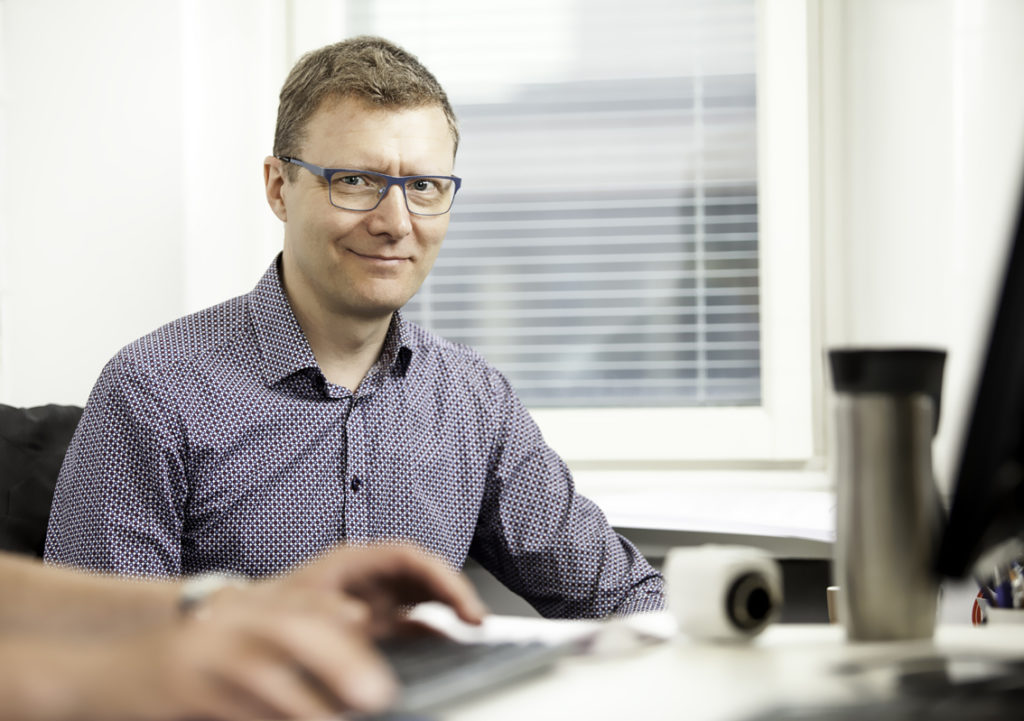16.1.2018 - Johannes Puro - District heating

Rarely in life you get the chance to choose between well-earned early retirement or helping to save the world with a new innovation. After a successful career at Nokia, the Fourdeg trio was in fact at that point – and decided to use their experience from global business creation for something they felt most urgent.
– Together with Jarkko Saunamäki and Mikko Kaijärvi we wanted to find a scalable business model to cut CO2 emissions quickly, starts Markku Makkonen, the CEO and one the founders of Fourdeg.
– We were eager to make a difference and make it fast.
After investigating the leading emitters, it proved out that major part of the carbon dioxide emissions were due to heating of buildings. For example in Helsinki heating is responsible for more than 50 % and in Berlin more than 40 % of the CO2 emissions. For instance, consumers are paying much more for their heating than for their telecommunication.
– There was our problem to fix. We decided to start by tackling the buildings with water radiator based heating since water radiators are widely used around the Northern hemisphere, in most parts of the European Union, Russia and China, Makkonen explains.
Usually district or central heating is operated by managing the average room temperature of the building and limiting the room temperature with passive thermostats.
– That leaves a lot of room for improvement as the room’s isolation, the direction of sunlight, the purpose and the usage of the room may vary a lot affecting the need for heating. Even if the average temperature of the building might be right, individual rooms can be far from it.
Makkonen suggests that the centralised heating equalises the residents although they have individual needs and preferences.
– 19,5 degrees Celsius might be ideal room temperature for one resident, but not necessarily for his next-door neighbour.
It is no wonder that the key element of Fourdeg’s own Smart Heating service is the possibility to choose the optimal temperature for every room individually.
Smart Heating predicts the heating needed per room and allows the residents to adjust the desired temperature – and then automatically delivers accordingly. The system works in any centrally or district heated buildings where the heating is performed with water radiators.
“The implementation is always fast and clean, no matter what age or size the building is.”
The actual product consist of the artificial intelligence of the cloud software and thermostat equipped with IoT sensors that will be placed on the radiator.
– Usually our IoT equipment are industry standard but we also utilize tailored thermostat devices and optionally external multi-sensors for indoor temperature and humidity. The implementation is always fast and clean, no matter what age or size the building is.
The process is straightforward: At first, the old passive thermostat is replaced with a smart thermostat that is connected to the cloud. Gradually the intelligence will get to know the thermal response of the room, after which the radiators can be adjusted to a suitable temperature even remotely.

Fourdeg’s IoT-enhanced thermostat.
The Smart Heating service is available for building owners either directly from Fourdeg or via local service partners e.g. building management service companies, specialist plumber companies or energy companies. The costs are lower if the change is done together with routine pipe repairs but according to Makkonen, the service is worth investing in any case.
– The investment payback is typically 3 to 5 years, and the internal rate of return (IRR) more than 20 %. Most importantly the heating quality for the people who are working or living in the buildings will be substantially better than before, he explains.
“For a property owner the service gives a chance to take better care of their building”
– For residents it is an investment on living comfort but for a property owner the service gives a chance to take better care of their building and even prevent moisture damages as they gain proper control of the temperature in all areas.
Over the years, Makkonen has learned that the property owners often seem to think more about the wellbeing of the residents than the financial savings:
– Of course the financial perspective counts when making a decision like this, but we have noticed that most of all the owners just want the people and the building to be well and safe.
Traditionally a lot of the the district heating energy production is wasted because all buildings tend to require peak energy at the same time. Unnecessary peak production is causing tons of CO2 emissions and is also just a waste of money – finally consumers money.
The possibility to adjust temperature remotely allows the property owners to target heating resources to where the need is greatest and save money on heating costs. This affects especially office buildings that are usually empty during weekends and holiday season.
– Just think about it. There’s no need to heat up empty office spaces to the maximum when the demand is peaking. Focusing on households and offices in use helps to create as comfortable conditions as possible for everyone.
“Smart heating is a clear win-win-win for consumers, building owners and district heating companies”
Fourdeg’s service package connects the buildings into district heating demand side management system. The service has been studied by Aalto University to provide industry best demand response gain and still ensure acceptable heating to all rooms even if the demand response is active.
– Smart heating is a clear win-win-win for consumers, building owners and district heating companies, Makkonen points out.

The visual user interface of the Smart Heating service.
Fourdeg has already piloted successfully in Sweden, Germany and China and according to Makkonen, they are aiming to create value adding partnerships with local energy and building management service companies in selected markets.
– Our target is not only to be cleantech but also clean business. Someday it would be cool to say at the Slush Founder Stage that “Yes, in collaboration with our regional partners we’ve reached >100 M€/yr SaaS business by creating ecosystem to cut 20 % of heating CO2 emission in Helsinki, Berlin and Beijing.”
– We are not there yet but we have managed to improve the quality of heating and heating energy economy for the better of both consumers and property owners, and therefore lower the harmful emissions. The relevance of our work is an important accelerator in all of this.
– To make a change, you can’t just wait for the moon to fall from the sky. You have to do what you can and do it now.
Interviewee
Author

Leave comment - comments(0)